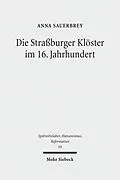In the course of the introduction of Protestant theology, the magistrate sought to close the many monasteries in Strasbourg, which Martin Luther had ruled not compliant with the new doctrine. However, a small number of monasteries survived, some well into the 17th century. The author compares dissolved and surviving convents, seeking an answer to the question of which factors enabled a community to sustain Catholic life in a Protestant environment.
As in many other imperial cities in 16th century Germany, Strasbourg introduced the Reformation early on. In the course of the introduction of Protestant theology, the magistrate sought to close the many monasteries in town, which Martin Luther as well as Strasbourg's most important Protestant thinker, Martin Bucer, had ruled not compliant with the new doctrine. However, a small number of monasteries survived, some well into the 17th century. The author compares dissolved and surviving convents, seeking an answer to the question of which factors enabled a community to sustain Catholic life in a Protestant environment. She focuses particularly on the role gender played and analyzes the differences between male and female communities, their different positions in 16th century society and their different restrictions and opportunities.
Autorentext
Studium der Mittleren und Neueren Geschichte, Politikwissenschaft und Publizistik in Mainz und Bordeaux; 2005-09 wissenschaftliche Mitarbeiterin am Historischen Seminar der Universität Mainz; seit Frühjahr 2011 Mitarbeiterin der Meinungsredaktion des Tagesspiegels in Berlin.
As in many other imperial cities in 16th century Germany, Strasbourg introduced the Reformation early on. In the course of the introduction of Protestant theology, the magistrate sought to close the many monasteries in town, which Martin Luther as well as Strasbourg's most important Protestant thinker, Martin Bucer, had ruled not compliant with the new doctrine. However, a small number of monasteries survived, some well into the 17th century. The author compares dissolved and surviving convents, seeking an answer to the question of which factors enabled a community to sustain Catholic life in a Protestant environment. She focuses particularly on the role gender played and analyzes the differences between male and female communities, their different positions in 16th century society and their different restrictions and opportunities.
Autorentext
Studium der Mittleren und Neueren Geschichte, Politikwissenschaft und Publizistik in Mainz und Bordeaux; 2005-09 wissenschaftliche Mitarbeiterin am Historischen Seminar der Universität Mainz; seit Frühjahr 2011 Mitarbeiterin der Meinungsredaktion des Tagesspiegels in Berlin.
Titel
Die Straßburger Klöster im 16. Jahrhundert
Untertitel
Eine Untersuchung unter besonderer Berücksichtigung der Geschlechtergeschichte
Autor
EAN
9783161586071
Format
E-Book (pdf)
Hersteller
Genre
Digitaler Kopierschutz
Adobe-DRM
Dateigrösse
3.01 MB
Anzahl Seiten
448
Lesemotiv
Unerwartete Verzögerung
Ups, ein Fehler ist aufgetreten. Bitte versuchen Sie es später noch einmal.
